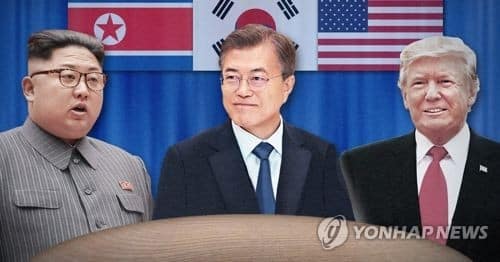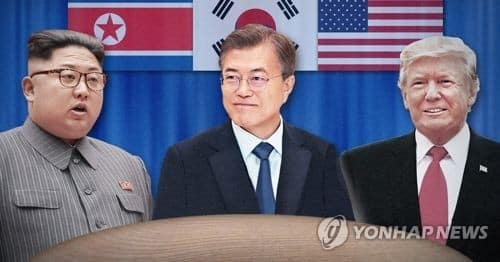
In this same week the New York Times asserted North Korea is engaged in a “great deception” over its nuclear forces, South Korean unification minister Cho Myoung Gyon is visiting the United States with plans to meet Secretary of State Mike Pompeo, a Member of Congress, and to address several forums.
Will he speak of diplomatic failings and deceptions? Or will he talk about how to make progress as the two allies seek a balance between economic rewards and North Korean denuclearization?
It’s likely the latter. Cho may compare the situation to one year ago, when the Council of Foreign Relations put the chances of nuclear war at 50%. Since then: the Olympics attended by North and South, the Trump-Kim-Moon summit, multiple intra-Korea summits, and positive steps economically and symbolically. The reality is we are watching complex diplomacy unfold in real time, meaning things can appear to move slowly. But with the Americans, the minister is likely share a perspective that with the movie played at double-speed a different picture emerges.
The question is not so much if progress is occurring, but if, driven more by the Koreas than Washington, it isn’t moving fast enough. Jeong Se Hyun, former unification minister, reminds it is “unprecedented” for Seoul’s unification ministry to deal directly with the State Department. The reason? “In this situation where the United States is putting the brakes on United States-North Korea relations, there is a need for the unification ministry to directly persuade the State Department,” Jeong said.
A year ago it was reported the United States was imminently preparing to attack North Korea. Instead of holocaust, what followed was a summit in Singapore. Officials from North and South now meet regularly, Secretary Pompeo has been to Pyongyang, and there is a new American Ambassador (a career Navy officer whose father fought in the Korean War) and Deputy Chief of Mission (a professional diplomat with nearly a decade of Korean experience) in Seoul. The United States has a Special Representative for North Korea. Diplomatic infrastructure is being built.
Yet the headlines this week raise concern over a “great deception” by the North Koreans, evidenced by a think tank “discovering” North Korean missile facilities already long known to United States intelligence. As dramatic as that sounds, South Korea’s presidential spokesperson put those “new” missile facilities into a more accurate perspective, saying “North Korea has never promised to shut down this missile base. It has never signed any agreement, any negotiation that makes shutting down missile bases mandatory… There is no agreement, no negotiation that makes it necessary for it to be declared.” All of this was to be expected; Kim Jong Un in his January 2018 New Year’s Day guidance stated North Korea would shift from open air testing to maintaining nuclear weapons in such facilities.
The larger story left in the shadows of such created-drama is the ongoing rush forward driven by the two Koreas themselves, the most likely subject of discussion this week between Minister Cho and Secretary Pompeo.
Since the Trump-Kim-Moon summit the two Koreas established pseudo-embassies just north of the Demilitarized Zone, where representatives have met more than 60 times. The offices have become clearinghouses for over a dozen joint economic initiatives, including a massive project in preparation for greater cross-border trade to link roads and railroads severed during the Korean War. North and South Korea have removed landmines and other weapons from the border and drawn back border guards. Kim offered to permanently dismantle two key ICBM facilities under the observation of outside experts, and to negotiate further on the permanent shut down of the nuclear facility at Yongbyon.
While Minister Cho and Secretary Pompeo will no doubt agree that’s not a bad start for the first five months since Singapore, of likely concern to the United States is South Korean President Moon Jae In’s belief economic progress is a necessary fore step to ultimate denuclearization. He almost certainly sent Cho to Washington seeking American concurrence to increase economic cooperation with the North, including asking for changes to sanctions now limiting some financial transactions. Moon himself lobbied Russia leader Vladimir Putin along the same lines, and will make a pitch to Vice President Pence on the sidelines of the Association of Southeast Asian Nations ASEAN Summit this week.
Moon seeks sanctions relief as negotiations move forward, no doubt holding little is accomplished without some give and take. “I believe the international community needs to provide assurances that North Korea has made the right choice to denuclearize and encourage North Korea to speed up the process,” he said this week in Paris. American domestic politics sees things flipped 180 degrees, with sanctions relief a thank-you gift delivered after the last nuke is carted away.
Despite the situation as described by pundits – a sneaky North Korea duping an uninformed American president – the reality appears much closer to a process now at a crossroads between two visions of a way forward. North and South Korea appear to want economic progress, paced with concessions by the North. Under criticism Trump is naive, the American side wants aggressive steps toward denuclearization first, with economic progress largely withheld instead of fed incrementally. How much the United States is willing to incentivize denuclearization is much more likely the subject Minister Cho and Secretary Pompeo will discuss then North Korean missile bunkers both have long known about.
Time matters. A new American president in 2020 will be unlikely to press the case in North Korea, receding back into the politically safer waters of previous decades’ policy of largely ignoring things. Washington is not alone in seeing strategy held hostage to domestic politics. In the South, progress with North Korea is widely supported, and Moon will see electoral challenges if he does not deliver results. Kim’s domestic situation is less clear, but he faces pressure for economic progress from his growing middle class while at the same time must tamp down the suspicions of his hard line supporters that he may give away too much too soon at too low a cost.
Minister Cho may remind his reluctant American interlocutors decades of sanctions have yielded only a nuclear North Korea. The nukes are part of a problem solved by a comprehensive solution that takes into account what the North is really at the table for: engagement with the world system and assurance of its own survival. That ultimate goal will require the North’s nuclear weapons to become unnecessary, as Pyongyang agrees internally to and is allowed externally to become so engaged with the global system it finds itself no longer in need of such a powerful deterrence. It can be done; the world has the broader road map of Deng Xiaoping and China to follow forward.
This isn’t faux optimism. This is diplomacy, chock-a-block with hard choices and twisty decisions, a push and pull between priorities. The underlying challenge for the three parties is not about media bleating, North cheating, and Trump tweeting, but finding the proper balance of economic incentives which match both strategic and domestic needs, in three national capitols. All that before time runs out.
Reprinted with permission from WeMeantWell.com.

